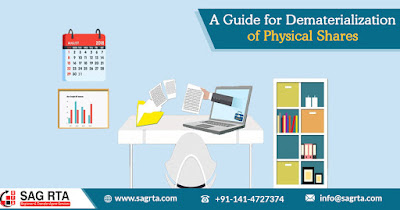A large number of shares are bought and purchased by the investors with SEBI being the regulatory body in the whole process. In line with the protocols of legal authorities, such shares are present in either physical or electronic form. Physical Shares or Share certificates have a paper presence whereas electronic shares are in the dematerialized form stored in the Demat Account of the concerned Investor.
As stated by the Laws of Companies Act 2013, the complete transaction of Shares and Securities will be in Demat Form effective from 2nd October 2018, which also means from 1 October 2019 no company will be allowed to transfer its shares and securities in physical form. Owing to this current amendment investors have to open a Demat Account under their name by submitting the Dematerialization request.
An Registrar & Transfer Agent Service provider offers assistance such as dematerialization of shares, complete record-keeping, contact with the national depositories, expert assistance related to investment opportunities or assistance to any other query of the customer.
Demat Account
Dematerialization of Shares is a process in which shares owned by the investor are converted into electronic form and stored in the Demat Account of the respective investor. So clearly a Demat Account holds the shares and securities present in the electronic form to facilitate the investor with online visibility of his purchased shares.
The concept of Demat Account was initiated by the Securities and Exchange Board of India (SEBI). SEBI is India’s largest regulatory body for all types of share transactions in the Indian market, operating since 1996 in India.
Demat Account is almost equivalent to a bank account. The only difference is that it holds shares, securities, bonds and mutual funds on behalf of the investor. Earlier, holding a Demat Account was recommended to those who trade with shares and securities on a regular basis. But from now onwards it is mandatory for every investor to get a Demat Account regardless of how frequently he is trading on shares.
Before we jump into the step-wise procedure to open a Demat Account lets get familiar with the two crucial terms with regards to share transactions (i) Depositories and (ii) Depository Participant.
National Depositories and Depository Participants
National Depositories - Operating under the surveillance of SEBI, National Depositories are the organizations responsible for holding all the registered shares and securities in the country. There are two major depositories namely National Securities Depository Limited (NSDL) and Central Securities Depository Limited (CSDL). Transactions of all the registered shares and securities is possible only through these two main depositories.
Depository Participants - These are organizations working as an intermediary between the investor and the main depositories. For opening a Demat Account, the investor needs to approach the Depository Participants.
Steps to open a Demat Account
Step 1: Approach a DP which can be any financial institution like banks, brokers, etc.
Step 2: Fill in the application form with accurate details for opening a Demat Account affixing the copies of the required documents.
Step 3: Once the online documents are submitted by the investor, the officers from the DP comes for the in-person verification.
Step 4: Once the information is checked for its authenticity, a unique account number is given to the applicant by the DP which is required by the investor to access his/her online Demat Account.
The expense for opening a Demat Account
Following the completion of the account opening process, the Demat account holder gets an agreement copy from the concerned DP enlisting the terms and conditions, rules and regulations along with the applicable charges. Generally, the DPs offer free of cost Demat Account while there are some who charge a certain amount or some take refundable charges.
The account holder is charged with the transaction fees along with the annual maintenance fees and the conversion fees (dematerialization of shares and securities).
Points to remember while opening a Demat Account
- It takes 7-14 days for a Demat Account to get active.
- Investors can open different accounts with different DPs.
- No minimum share limit is set for opening a Demat Account.
- It is mandatory to add a beneficiary while opening a Demat Account
- KYC is mandatory before opening a Demat Account.
KYC Conformity
Getting KYC done is mandatory if you want to have a Demat Account. As the process above says that the investor has to apply by submitting the application along with the valid documents to the concerned DP for availing a Demat Account.
Identity Proof - The copy of any government authorized ID like Adhaar Card, PAN Card, Passport or Voter ID can be submitted by the applicant.
Address Proof - Applicant’s residence proof like ration card, electricity bill, water bill or any ID Proof having the place of residence mentioned in it.
Bank Details - It is a must for the applicant to submit his/her basic bank details like bank account number, etc.
Benefits of owning a Demat Account
- A Demat account eliminates the chances of your shares, securities, bonds and debentures getting misplaced, robbed or damaged.
- The charges on the transaction of shares is less if done via a Demat Account as compared to the physical one.
- A Demat Account has made transactions more easy and less time consuming for investors.
- There are no restrictions on the number of shares you buy or sell via a Demat Account.
- Online transactions and management is far convenient these days than physical transactions of shares.
- More secure than physical shares transactions.



